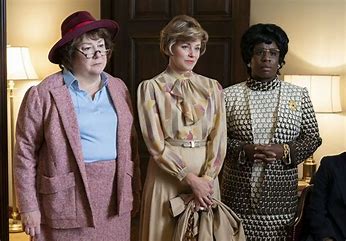The final scene in “Mrs. America” is redolent of Chantal Akerman’s 1975 masterpiece “Jeanne Dielman.” Is it un homage à Akerman by writers Dahvi Waller, Joshua Allen Griffith, and directors Anna Boden and Ryan Fleck?
The biopic of Phyllis Schlafly, “Mrs. America”, debuted on Hulu in 2020. At the time, a few savvy viewers noticed a striking similarity between its final scene and the late director Chantal Akerman’s masterpiece Jeanne Dielman”. Or, to give it its full title, “Jeanne Dielman, 23, Quai du Commerce, 1080 Bruxelles”.
It’s January 1981, and Reagan has just informed Schlafly (Cate Blanchett) over the telephone that she will not be offered a cabinet position in his administration. Schlafly’s list of Republican contacts, from her work with the ERA, was influential in getting Reagan elected president in 1980. However, she was considered too polarizing a figure when American politics were not as polarized as they are today to be included in his inner circle. Despite this woman’s unsympathetic nature, how the next scene unfolds leads us to feel a surprising degree of compassion toward her.

Margot Martindale as Bella Abzug, Elizabeth Banks as Jill Ruckelshaus, and Uzo Aduba as Shirley Chisholm
Her husband (John Slattery) tells her she has been robbed and then casually asks when dinner will be served. Blanchett slowly hangs up the phone and returns, defeated, to the kitchen. The camera then frames her in a medium shot and, in a single take that will last about one minute, she sits at the table, facing us, and begins to robotically peel one apple, then another, then another. And there she is, before our eyes. We are witnessing the renaissance of Jeanne Dielman!
https://thebrownees.net/essay-one-1-2-65-queer-films-under-the-hays-code-1934-1967/
https://thebrownees.net/essay-one-1-34-queer-films-made-under-the-hays-code-1934-1956/
https://thebrownees.net/essay-one-2-31-queer-films-made-under-the-hays-code-1957-1967/
https://thebrownees.net/essay-one-table-65-queer-films-made-under-the-hays-code-1934-1937/
https://thebrownees.net/essay-two-45-queer-films-from-1967-1976-queer-cinema-comes-out/


















